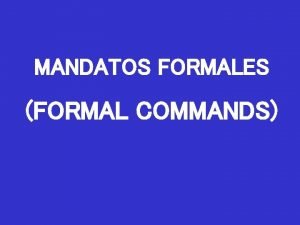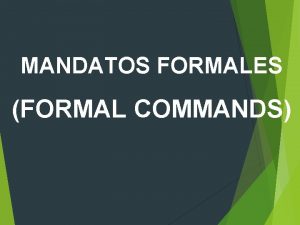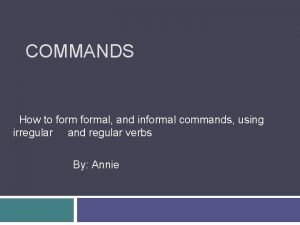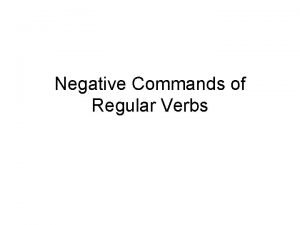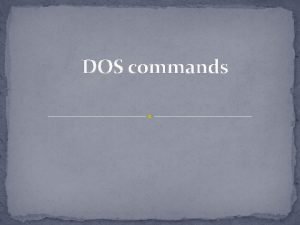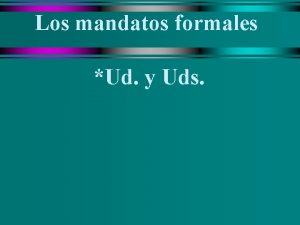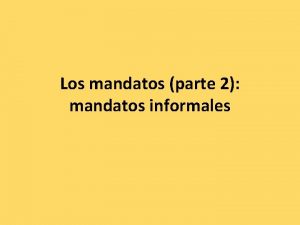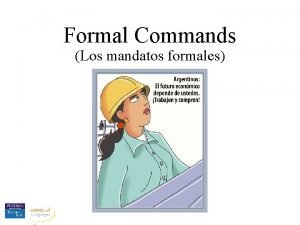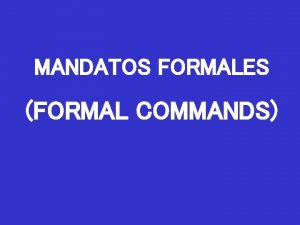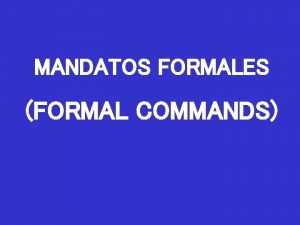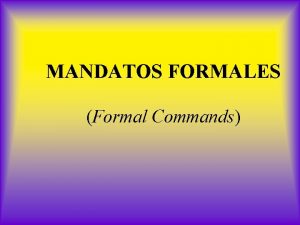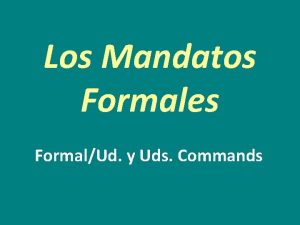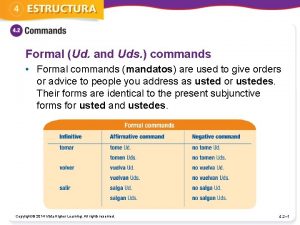MANDATOS FORMALES FORMAL COMMANDS In Spanish there are











- Slides: 11

MANDATOS FORMALES (FORMAL COMMANDS)

In Spanish, there are special verb forms used when one gives a “command” Ex: Leave now! Do the homework! Don’t talk!

Depending on who you are speaking to, here are the command possibilities…. . “Formal” (USTED & USTEDES) “Informal” (TÚ & VOSOTROS) We are going to learn the USTED & USTEDES now…!

To form the command: 1. “yo” form in present tense: cantar = canto abrir = abro beber = bebo 2. Remove the “o” and add “opposite vowel” (Add “n” also for the plural ustedes command) -ar verbs = e(n) -er/-ir verbs = a(n) ¡cante usted! or ¡canten ustedes! ¡abra usted! or ¡abran ustedes! ¡beba usted! or ¡beban ustedes!

3. Negative commands: Add “no” directly in front of command form. ¡no cante! or ¡no canten! ¡no abra! or ¡no abran! ¡no beba! or ¡no beban!

4. Why even consider the “yo” form in present? CAREFUL to remember irregular yo forms and stem changing verbs! poner = pongo = ¡ponga(n)! hacer = hago = ¡haga(n)! salir = salgo = ¡salga(n)! venir = vengo = ¡venga(n)! decir = digo = ¡diga(n)! volver = vuelvo = ¡vuelva(n)! hervir = hiervo = ¡hierva(n)! pedir = pido = ¡pida(n)!

5. -CAR, -GAR, -ZAR verbs. Remember spelling patterns! buscar = busco = busque(n) llegar = llego = llegue(n) empezar = empiezo = empiece(n)

6. Irregular Formal Commands (only 5 verbs!) Ustedes ir = vayan ser = sean saber = sepan estar = estén dar dé den =

7. Pronoun Placement With Commands (reflexive verbs, IOP’s & DOP’s) Affirmative: “Attach ‘em! (add accent on original stress) Negative: “Don’t attach ‘em!”

Examples: Infinitive Affirmative Ud. Negative Ud. divertirse ¡diviértase! ¡no se divierta! levantarse ¡levántese! ¡no se levante! lavarse ¡lávese! ¡no se lave! preparar ¡prepáreme! ¡no me prepare! hablar ¡háblele! ¡no le hable! esperar ¡espérenos! ¡no nos espere! decir ¡dígamelo! ¡no me lo diga! traer ¡tráigaselos! ¡no se los traiga! servir ¡sírvanoslas! ¡no nos las sirva!

REVIEW OF PRONUNCIATION RULES! 1. Word ends in vowel, N, S = Stress NEXT TO LAST syllable zapatos cebolla yo hablaba cuaderno rebanada ellos trabajan ranura ella retira 2. Word ends in any other consonant = Stress LAST syllable comer ciudad congelador llegar terminal arroz 3. Dipthongs a e o Exs: cua/der/no puer/ta i u beber coliflor papel a e o cien/cias air/e pei/nar/se aur/i/cu/lar

